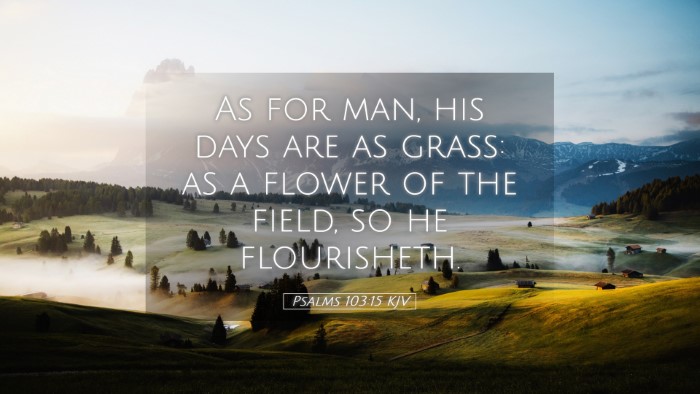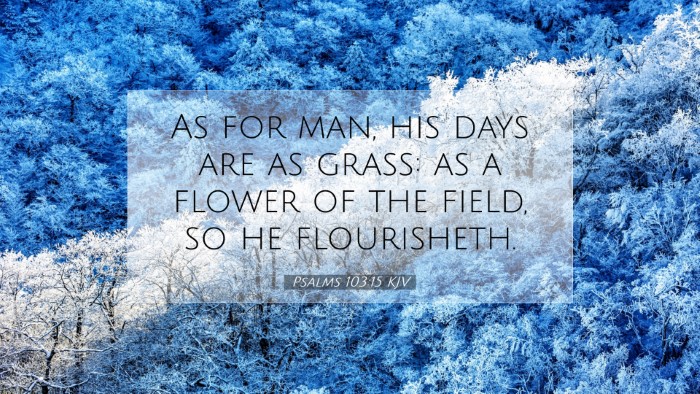Psalms 103:15 - Commentary and Insights
Verse: "As for man, his days are like grass; as a flower of the field, so he flourisheth."
This verse provides a poignant reminder of the ephemeral nature of human life, contrasting it with the durability and eternality of God's love and mercy. It encapsulates a fundamental theme in scripture: the transient nature of human existence in the light of divine eternity.
Contextual Analysis
The Psalmist, traditionally attributed to David, reflects on the compassion of God towards humanity. It is important to understand the surrounding verses to grasp the full meaning of verse 15. In the preceding verses, the writer extols the blessings bestowed by God upon His people, emphasizing forgiveness, healing, and renewal.
Insights from Commentaries
Matthew Henry's Commentary
Matthew Henry poignantly highlights the frailty of human life through this verse. He notes that God's perspective of humanity reveals that while men may flourish temporarily, like grass and flowers, they are inherently fragile and transitory. He writes:
"Man’s life is but a shadow which appeareth for a while and then vanisheth away; and therefore, it is a very great mercy of God that He protects us and has mercy on us in this life."
Henry emphasizes the biblical truth that life is fleeting and that one must not put ultimate trust in human accomplishments, for they will ultimately fade away. He encourages believers to look beyond their earthly existence to the eternal promises of God.
Albert Barnes' Notes
Albert Barnes elaborates on the metaphor of grass and flowers, pointing out that these are common imagery throughout the Scriptures used to denote the temporary nature of human life. He explains:
"The grass of the field, and the flower of the field, flourish for a time and then are cut down; so are the days of man."
Barnes points out the inevitability of death and decay, signaling to readers the importance of utilizing their days wisely. He suggests that while the body may perish, the soul has the potential to endure forever, thus redirecting focus to the divine aspects of life and spirituality.
Adam Clarke's Commentary
Adam Clarke provides a detailed exploration of the metaphorical significance of the verse. He states:
"The life of man is but a temporary bloom, as the flower fades and the grass withers, so we pass away."
Clarke also focuses on the analogy between the human life cycle and nature, drawing attention to how both begin with vibrancy and fade into nothingness. Importantly, he associates this with the coming of God’s eternal plan for humanity, which ensures that even though life is fleeting, there is hope in the resurrection and life after death.
Theological Implications
This verse challenges both believers and theologians by invoking a sense of humility and reflection on the brevity of life. It also raises crucial discussions regarding:
- The Nature of Humanity: The fragility and temporality of human existence are emphasized throughout biblical texts, reminding humanity of its need for divine sustenance and mercy.
- Divine Sovereignty: The transience of life points to God’s eternal nature. It suggests that human lives are subject to His will and plan.
- Hope and Eternity: While highlighting mortality, the verse simultaneously points believers towards eternal truths that exist beyond the physical world.
Application for Believers
For pastors and spiritual leaders, this verse serves as a powerful tool in teaching the congregation the importance of prioritizing eternal over temporal concerns. It encourages:
- Reflective Living: Encouraging believers to make the most of their days by serving God and their communities, recognizing the fleeting nature of time.
- Evangelism: Urging believers to share the message of hope and salvation, understanding that life is short for all, and the gospel needs to be shared.
- Spiritual Growth: Encouraging individuals to focus on their spiritual journey, understanding that true fulfillment comes from a deep relationship with God rather than temporal satisfaction.
Conclusion
Psalms 103:15 encapsulates the essence of mankind's mortality and God's eternal nature. By delving into commentaries from respected theologians, readers can both appreciate the depth of this verse and apply its lessons in their lives. With an understanding of the brevity of life, believers are called to a higher purpose—living in service to God and others while anticipating the eternal promises that lie beyond this world.


